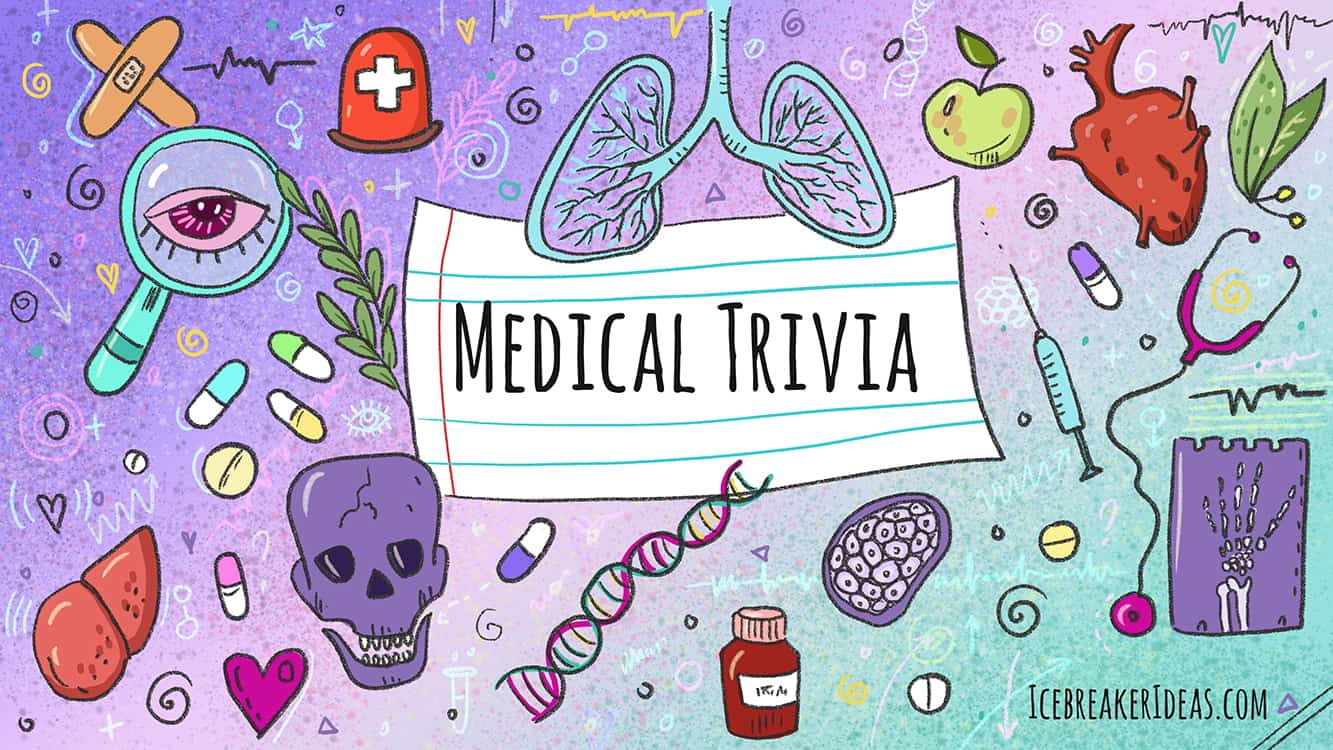A long and happy life becomes more possible when we are in good health. Knowing how our bodies work can contribute to that longevity. Therefore, it is important to have some rudimentary medical knowledge. In this article, we challenge you to discover how much you know about the world of health and medicine.
Table of Contents
We begin with some general Medical Trivia Questions anyone should be able to answer. Our Medical Trivia Facts contain some interesting information that will surprise most of our readers. Next, we have Easy Medical Trivia at which all our readers should excel. Two sections, Medical History Trivia and Medical Trivia for Nurses require serious exposure to the medical world. Finally, we have a section on Medical Trivia Team Names. Those of you in the medical profession can find the perfect name for your professional development team exercises, and others can use our list for their trivia night challenges.
Medical Trivia Questions
With the advent of tv and other forms of electronic communication, we have all become much more aware of everything related to our human bodies and health. Advertisements for medications, annual physical examinations required by our insurance, and informational programming all provide us with a myriad of terminology and facts. Our Medical Trivia Questions also include information you learned in your high school science classes. See how well you can do and then test your friends and family.
- What medical condition does a lack of iodine in your diet lead to?
- What is an open sore that is slow to heal referred to as?
- If you have high cholesterol levels, you are at risk for what kind of disease?
- How does insulin travel around your body?
- How many chambers does your heart have?
- Where is your strongest muscle found and what is it?
- What can obesity, diabetes, and stress contribute to?
- If you have psoriasis, which organ of your body is affected?
- What are the medications given to patients who have elevated levels of lipids in their blood, otherwise known as “good or bad” cholesterol?
- What is the largest artery in the body?
- What are the bones that make up your spine called?
- What system does the liver belong to?
- What is the name of the disorder which comes from Greek and Latin words meaning “without appetite” and “nervous”?
- What is the process used to treat patients with defective kidneys, by removing excess water, solutes, and toxins from the blood known as?
- Warfarin belongs to which class of “blood-thinning” medications?
- When proteins in the eye form clumps, preventing normal movement of light through the eye and resulting in a clouding of the lens, what occurs?
- What does your cartilage, a connective tissue, link?
- The most common diagnosis of dementia that causes a long-term and often gradual decrease in the ability to think and remember is named what?
- Your genetic information is carried by what?
- Which is more sensitive, your sense of taste or your sense of smell?
- What is the largest organ (by surface area and weight) in your body?
- What do they test to determine your blood sugar levels?
- If the blood supply to a particular part of your the brain is cut off, what might you have?
- What is the medical condition that has as one of its leading symptoms lumps in the breast?
- The system in your body that breaks down food for nutrients and removes waste is called what?
- What type of your blood cells are responsible for fighting infections and diseases?
- About what percentage of the human body is made up of water?
- Which of your internal organs stores bile?
- If you have an illness that comes and goes very quickly, what is it called?
- What is the used to describe a disease that is common or even constantly present in a specific population?
- Prostrate, thyroid, pituitary, sebaceous, pineal, and salivary are all what?
Medical Trivia Facts
The human body is truly amazing! You will be surprised at some of these Medical Trivia Facts. However, they will help you understand why our bodies function the way they do. Remember, the information given applies to the average human in average health with an average lifespan.
- Your heart beats over three billion times during your lifespan.
- If you sneeze, what you expel can travel 100 mph or more.
- Your ears and nose never stop growing.
- You will eat approximately thirty-five tons of food in your lifetime.
- During your lifetime you will walk around the world four times or 100,000 miles.
- When you were a baby, you did not shed tears until you were at least one month old.
- Your body actually gives off a tiny amount of light, although it is too little to see.
- Your fingernails grow about twice as fast as your toenails.
- Your fingers do not have muscles for movement; tendons are moved by the muscles in your forearm.
- If you wonder why your knees hurt, consider this. When you walk across level ground, the force on your knees is the equivalent of one½ times your body weight.
- When you blush, that is special, as humans are the only species known to blush.
- You can see more shades of green than any other color.
- You spend about five years of your life eating.
- Your tongue has its own unique print, just like your fingers.
- Your liver is the only organ that can completely regenerate and only needs 25% of the original liver mass to do so.
- You will blink about 12,000 times a day, which is about 200,000 times in a year.
- Scientists estimate that your nose can recognize a trillion different scents.
- You breathe about 20,000 times a day.
- You have about sixty-seven different species of bacteria in your belly button.
- You pass gas about fifteen times a day.
- Your hair grows about six inches each year and your scalp contains about 100,000 hairs.
- Your heart beats more than three billion times in your life.
- There are more bacteria in your mouth than there are people in the world and ten times more bacteria cells in your body than human cells.
- You get a new top layer of skin every 30 days. No wonder dead skin comprises about a billion tons of dust in the earth’s atmosphere.
- Your skin is thinnest on your eyelids and thickest on your feet.
- Your saliva contains your entire genetic blueprint.
- You are taller in the morning than you are at night.
- You cannot breathe and swallow at the same time.
- Contrary to what you may have heard, your fingernails do not grow after you are dead.
- If you yawn, it may be helping you control your body temperature according to scientists.
- Your stomach acid can dissolve metal; acid reflux causes pain because the lining of your esophagus is being burned by stomach acid.
Easy Medical Trivia
You might be surprised just how much medical information you have picked up over the years. We have chosen questions for our Easy Medical Trivia from information you probably gleaned from your high school science classes, television shows and commercials, and your own medical experiences.
- P. are initials referring to what type of doctor?
- Glaucoma and cataracts effect which part of the body?
- When measuring temperature, what is considered normal?
- What is the ability to do physical activity known?
- What are the natural openings in the skin called?
- What is the surface of the eye called?
- What medical condition is the failure of the body to produce enough insulin?
- What is the flow of blood through your heart and around your body called?
- What is the name for the colored part of the eye?
- What patients does a pediatrician treat?
- What is the name of the hormone in an EpiPen?
- Which organ stops causing cardiac arrest?
- Which three diseases is the MMR vaccine for?
- What type of cancer is melanoma?
- What is the body’s largest, strongest, and longest bone called?
- How many bones do you have in your body?
- What parts of the body have more than half of your bones?
- What is the preferred place for checking the pulse of a conscious adult?
- What is the name of the disease caused by reduced bone density?
- What is the common name for the lymphatic tissues on either side of the back of the human throat that are at their largest during the teenage years and must sometimes be surgically removed?
- What is the study of the human body called?
- How is the flu vaccine administered?
- What is the valuable life-saving maneuver that aims to get people to begin breathing again artificially?
- What is it called when blood is transferred into a person’s bloodstream?
- What is in a cavity of the body that is made of dead skin cells, ear secretions, and hair?
Medical History Trivia
To answer the questions in this section, you need more than a superficial knowledge of science and health. Those of you in the medical profession probably took a class in medical history and should have no trouble answering the following questions – that is if you can remember that far back!
- What famous author, also an ophthalmologist, studied medicine at the University of Edinburgh in the 1870s, was a determined supporter of compulsory vaccination, and partially based his most famous character on a former university teacher?
- What is the name of the treatment developed by Dutch doctor Willem Kolff using orange juice cans, sausage casings, and car parts to build his first prototype in 1943?
- What is the name of the disease caused by a lack of ascorbic acid in the body, which was the scourge of sailors up until the mid-18th century?
- What is the name of the textbook based on dissections performed on unclaimed corpses that later became the name of a popular tv medical drama?
- What is the name of the device In French physician Rene Laennec invented in 1816 to listen to the heart and lungs?
- What is the name of the liquid laxative developed by Charles Henry Phillips in 1873?
- Who realized in 1895 that a cathode ray tube could help one peer into the human body?
- In what year did the Spanish Flu pandemic, which infected an estimated five hundred million people and killed fifty million, begin?
- What is the name of the person who performed the first (kidney) transplant 1954?
- Who was the ancient Greek god of medicine known for his serpent-entwined staff?
- What is the name of the woman who was instrumental in developing radiation as a therapeutic tool?
- Which brand of the over-the-counter pain reliever acetaminophen marketed as a children’s fever medicine was introduced in 1955?
- What was the disease that caused an outbreak in the city of Philadelphia in 1793 that resulted in the death of more than 9% of the population?
- What was the parasite commonly prescribed in Europe in from the Middle Ages until the 19th century in Ancient Greece to help balance the body’s humors?
- What Austrian Empire friar is widely credited as the founder of genetics?
- In what year was the first anesthetic for an operation given?
- What is the name of the 19th century Austrian known as “the father of psychoanalysis?”
- Who is the Ancient Greek physician is known as “the father of medicine”?
- What is the name of the man who created the smallpox vaccine and is sometimes known as “the father of immunization”?
- Who is credited with the discovery of penicillin in 1928?
- What is the name of the individual credited with the invention of the microscope?
- What is the name of the person regarded as the founder of modern nursing?
- Who was the only woman in history who received an unshared Nobel Prize in Physiology or Medicine (awarded in 1983) for the discovery of mobile genetic elements?
- What was the original purpose of a nurse’s cap?
Medical Trivia for Nurses
Special people enter the nursing profession. They are known to be caring, compassionate, and knowledgeable. This section is especially designed for those individuals, although you are welcome to attempt to answer them if you think you know a great deal about specific health matters. (You may be married to or a relative of a nurse who frequently talks about their profession.) Give these a try and see how well you do.
- Which drug is known by the brand names Brufen, Advil, Motrin, and Nurofen?
- What is the name of the operation in which the vas deferens are cut and tied?
- What does a sphygmomanometer measure?
- Which of your organs is approximately seven meters in length?
- When does a baby’s heartbeat start during pregnancy?
- What is the name of the medical specialty concerned with diseases of the blood?
- How many muscles are there in the body to the nearest one hundred?
- A heart attack is scientifically known as what?
- A nephrologist is a doctor who specializes in the treatment and diagnosis of diseases affecting which organ?
- If a patient comes in with a “full thickness” burn, which degree of burn is it?
- Cephalgia is a medical term for what?
- What is the bone at the base of your spine known as?
- What condition is the DASH diet, a diet rich in grain products and fruits, designed to treat?
- How many times a day must a patient take a prescription that reads “q.i.d.”?
- If a patient comes in with a broken clavicle, what part of their body has been injured?
- The class of pain relievers known as NSAIDs (including naproxen and ibuprofen) stands for non-S__________ anti-inflammatory drugs?
- What part of the body is affected by trachoma?
- What does the term hypotension denote?
- What is the name of the medical condition that involves the blockage of the arteries?
- What is the name of the anti-malarial drug extracted from the bark of the cinchona tree?
- What is the name of the body system that produces and regulates hormones?
- Zidovudine (also known as ZDV or AZT) is a medication used to prevent or treat which virus?
- How much blood does the average human body contain?
- What does it mean if a nurse is acting as a patient advocate?
- What is the name for the disorder in which there is a strong urge to move one’s legs because they are aching, tingling, or have a crawling feeling that improves somewhat with motion?
Medical Trivia Team Names
When you choose a medical team name, you want one that is short, easily remembered, understandable, and applicable to your team members. Therefore, creating your own, unique team name is preferable. However, if you find yourself stuck or need a team name quickly, use one of ours.
- The Nightingales
- The Vibrant Vertebrae
- The Thick Skins
- The Anatomical Aces
- The Mighty Muscles
- The Heartbeats
- The Medical Marvels
- The Big Bones
- The Savvy Surgeons
- The Pain Killers
- The Treatment Team
- Nurses with Nerve
- Clinical Cuties
- The Happy Healers
- The Pain Killers
- The Wellness Team
- Total Caregivers
- Suture Sisters
- The Scrub Ups
- Helping Hands
- Diagnosing Divas
- Healthcare Heroes
- The White Coats
- The Medical Marvels
- Clinical Comrades
Our hope is that we covered many medical and health questions, and you learned not only how much you know about your body, but also some new medical information. We encourage you to share your knowledge with your friends and family. Additionally, have some fun using what we have provided for a family medical trivia night, a party game, or a trivia battle at your local pub or club. There is always more to learn about our amazing bodies and the more we know, the more able we are to be healthier and happier!
Susan majored in English with a double minor in Humanities and Business at Arizona State University and earned a Master’s degree in Educational Administration from Liberty University. She taught grades four through twelve in both public and private schools. Subjects included English, U.S. and world history and geography, math, earth and physical science, Bible, information technologies, and creative writing.
Susan has been freelance writing for over ten years, during which time she has written and edited books, newspaper articles, biographies, book reviews, guidelines, neighborhood descriptions for realtors, Power Point presentations, resumes, and numerous other projects.



